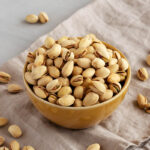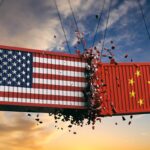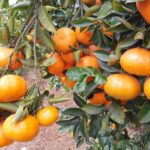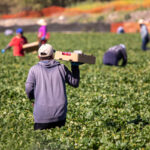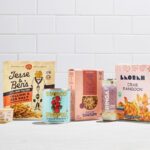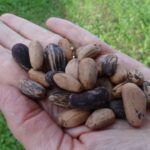Touring the world's leading port for fruit and veggie imports

Whether it be in a room loaded with Brazilian grapes, Ecuadorian bananas or Canary Islands-grown tomatoes, Opticool's quayside facility in the Port of Rotterdam is reverberating with activity coming from the forklifts and staff, and also a recently arrived delegation of global visitors.
It's quite a chilly day so the roller doors have been left open to a crisp breeze coming off the water, as the multinational hosts participants from the inaugural Amsterdam Produce Show and Conference.
They've had their share of networking, in-depth chats, forward-looking seminars and fine food, and now they are gaining insights into Europe's biggest port and the world's leading entry point for fresh fruit and vegetable imports.
Click here to see our photo gallery from the tour.
"It [the facility] was built in 1998 and we took it over in 2004. Why I made this choice in that moment on the waterside is very important - you reduce CO2 (carbon dioxide),"says Antonio Oken, who is now the Agro Merchants Group's produce category manager for Europe. 
"If we do everything by road there are more cost effects, timing schedule issues, whereas if you put it on a barge you can put 50 or 60 or 70 containers on that one barge.
"The tomatoes are going very fast. Every day it’s empty," he says when asked about the rotation of produce.
In another room staff are cleaning and inspecting Costa Rican pineapples, chosen specifically for their high brix levels.
"We have some clients who we cut it for, crown-less, but you have to cut it now and deliver and not save it in that case. We do it day by day, hour on the hour - when this was the beginning of the week the room was completely full."
Oken's facility was bought by Agro Merchants in 2014, adding to a fast-growing network of cold stores around the globe which in Rotterdam itself also includes ADB Cool Company (another host on the tour), ETL and the group's first European greenfield project in Massvlakte 2.
Not only does the Opticool facility have new owners, but the business model has also changed in how it deals with clients and retail programs.
"10 years ago it was 90% of the pallets going in and for 10% you had to do labeling or packaging or repackaging. Now at this moment it's completely on the other side - for 90% of the pallets you’re doing when you're retail-minded you need the labeling, you need repacking," Oken says.
"Why? The quality standard is going higher for the retailer. For many organizations there is a big change."
Opticool is also planning expansion into new facilities very soon, adding to the existing quayside operation which covers 20,000 square meters (215,278 square feet).
"We are looking now for the best locations – it is more of a one-stop shop. We do it together with Seatrade," he said.
When we get to the final room the floor is empty, as staff clean and ready the hall for the next round of pallets. Smartphones out to take photos and keeping Oken busy with questions, the delegation heads to a boat that is about to take them on a tour of Rotterdam and the port from the water.
 The boat ride gives the international group an opportunity to get to know one another, with fruit traders and growers from the Netherlands, the U.K., India, Nigeria, Romania, Serbia, Moldova, and the diverse list goes on.
The boat ride gives the international group an opportunity to get to know one another, with fruit traders and growers from the Netherlands, the U.K., India, Nigeria, Romania, Serbia, Moldova, and the diverse list goes on.
The next stop is ADB's facility. Commercial manager of logistics for fruit and vegetables Etienne Vennink concedes it may not have the quayside benefits of Opticool as it can only receive containers and trucks, but there are several value-added services.
"Both of the companies do have the possibility to pack a lot, so we are netting citrus, we are flow packing a lot of products, and we are shrink wrapping a lot of products just to make them finished for the retail directly," Vennink says.
"At ADB what we are doing on top of that is we are also ripening, not only bananas but mangoes, avocados and kiwifruit.
"We are trying to do something with papayas to give them a boost so the consumer can consume products immediately after buying...it is a trial though so you have to get the experience to do it right and that takes a little while."
But the biggest news for ADB is that 14 days prior to the tour (which took place Nov. 4), the company completed an expansion which boosts capacity by 6,000 pallets, taking the total capacity between Agro Merchants' existing Rotterdam facilities to more than 30,000 pallets.
"We built it because of the natural growth of our clients," he says.
"We are trying to be as transparent as possible – we are very open to our clients and show them what we are doing exactly. We know exactly where the pallet is, and we can show it on an internet portal if we scanned it, we show which truck it's loaded in, when it was loaded. Everything can be followed.
Vennink is reluctant to talk too much about specific commodities as his business simply follows what the client wants, but he does highlight expectations for a 10% year-on-year uptick in imports for this year's Southern Hemisphere table grape deal which is just getting underway. 
The ADB operation floor is equally as busy as Opticool's facility, with the added insight of its repacking works as staff undertake quality control for fruits including golden berries/physalis, passion fruit and apples.
Forklift activity continues, moving about pallets of New Zealand kiwifruit, Brazilian grapes and watermelons, Peruvian ginger, Israeli avocados, U.S. sweet potatoes and more.
Vennink also shows participants the fully automated sliding pallet positions that make organization much easier, as well as a frosty cold experience in the facility's rooms for frozen goods.
And while Vennink and Oken have found new benefits to their incorporation with Agro Merchants Group, particularly in terms of knowledge sharing, but another side-effect is a closer connection with traders in faraway places as the multinational expands its scope with new ports.
"The Agro Merchants Group is also expanding all over the world – they are trying to find sites where they can be helpful to their clients. At this moment we have between 55-60 different sites," says Vennink.
"They are trying to find some spaces in Eastern Europe, we are working on sites in South America, and trying to get some in South Africa to see if we can connect all those privately owned cool stores to each other to offer a closed solution to all of the clients."
Event feedback

The cool, industrial exterior of the Westergasfabriek was home to a "cozy and welcoming" event, perfect for gaining fresh insights and new contacts.
When asked about his thoughts on the Amsterdam Produce Show, the rivalry between the country's two largest cities comes through in Vennink's suggestion for it to take place in Rotterdam. But overall, he is quite positive about the first edition.
"It's a good networking opportunity there. All the people have time, they are very friendly and you can talk to them for a longer period," he says.
"It is the first year so it needs time to grow – what I also see is because of the little booths that we had over there, everybody is equal, whether you are a big company or a small company."
Alen Miric of Serbian grower, exporter and importer Darkom says he has attended other shows like Fruit Logistica in Berlin, Fruit Attraction in Madrid and WOP Dubai, but the Amsterdam Produce Show is entirely different.
"I don't know what to call it - this is a kind of Picasso exhibition, at the Westergasfabriek where everything is so nice, the music is super, there are chefs preparing their meals. It’s unique, I cannot compare this exhibition with anything else," he says.
"I see from this a lot of new opportunities and possibilities – aside from the loading possibility of goods, I see opportunities and ideas in selling, in promotion, in marketing, in the development of our company and our sales department, development of storage and facilities.
"I have some new ideas now that I’m going to put my energy in and make happen in Serbia."
British-based BanaBay business development manager Alessia Pilade says she would like the show to have more introductions with buyers, but on the whole it was an enjoyable and productive event.
"It's really cozy and welcoming so you feel you can have an intimate relationship with the people who are speaking to you. You have more time to think and understand.," she says.
"And the cocktail night was amazing. The music and the food were very good."
Ravikiran Dange of Monsoon Foods in India highlights the Netherlands is a "very strategic location" for a show such as the Amsterdam Produce Show and Conference.
"Since the event is happening in Amsterdam it’s a unique opportunity for the producers and retailers to interact under the one platform," he says.
It doesn’t happen frequently that a producer gets to know who the buyers and traders are in this industry, and under one platform it’s good to get more exposure."
















